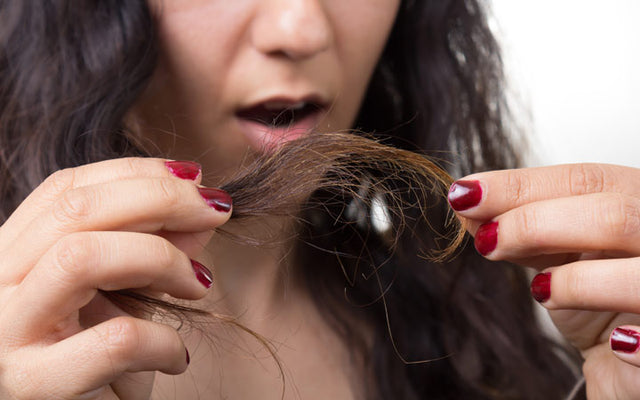
Blog
How to Stop Hair Breakage and Split Ends Naturally

Hair breakage and split ends are common struggles for many African women, especially with South Africa’s changing climate, from dry inland air to coastal humidity.
The natural texture of African hair, while beautiful and versatile, tends to be more fragile and prone to dryness. Overuse of heat, tight hairstyles, and chemical treatments only make matters worse.
Fortunately, you can restore your hair’s strength and shine using simple, natural remedies. By focusing on moisture, gentle care, and nutrient-rich ingredients like shea butter, aloe vera, and coconut oil, you can stop breakage, prevent split ends, and promote soft, resilient, and healthy hair naturally.
Understanding Hair Breakage and Split Ends
Hair breakage happens when strands become weak and snap, often due to dryness, over-styling, or lack of moisture. Split ends, on the other hand, occur when the protective outer layer of the hair shaft frays, causing the strand to split into two or more parts.
Both issues are common among African women because textured hair naturally loses moisture faster, making it more prone to damage. Environmental stress, heat tools, and chemical relaxers can worsen the problem. Recognizing these signs early allows you to nourish your hair properly, restore elasticity, and prevent further damage with natural, hydrating care.
Key Causes of Hair Breakage in African Hair
Hair breakage is a major concern for many African women, largely because textured hair is naturally more delicate and prone to dryness. One of the main causes is lack of moisture — African hair has tightly coiled strands that make it difficult for natural oils from the scalp to travel down the hair shaft, leading to brittleness and split ends. Overuse of heat tools like straighteners, blow dryers, and curling irons further weakens strands, stripping them of vital oils.
Another common cause is chemical treatments, such as relaxers and dyes, which break down the hair’s natural protein structure, making it fragile. Tight hairstyles like braids, weaves, and ponytails create tension on the scalp and edges, leading to traction alopecia over time. Using harsh shampoos that contain sulfates can also dehydrate the scalp and cause more hair breakage.
Lastly, poor nutrition, dehydration, and skipping regular trims contribute to weak, thinning strands. To prevent this, consistent moisture, gentle detangling, and protective styling are essential for maintaining healthy, strong African hair.
Essential Natural Remedies to Stop Breakage and Split Ends
Preventing hair breakage and split ends naturally begins with restoring hydration, nourishment, and protection to the strands. Nature offers many effective remedies that strengthen African hair, improve elasticity, and keep it soft and manageable.
1. Shea Butter: Rich in vitamins A and E, shea butter deeply moisturizes dry hair and seals in hydration, preventing split ends. It also forms a protective layer around the hair shaft, reducing friction and breakage.
2. Coconut Oil: This lightweight oil penetrates deeply into hair strands, replenishing lost proteins and reducing damage from styling and sun exposure. Regular use adds shine and softness.
3. Castor Oil: Packed with fatty acids and ricinoleic acid, castor oil strengthens the roots, promotes healthy hair growth, and prevents thinning or breakage, especially around the edges.
4. Aloe Vera: Naturally hydrating and soothing, aloe vera repairs the hair cuticle, smooths frizz, and locks in moisture. It’s especially beneficial for itchy or dry scalps.
5. Avocado Mask: Avocado is rich in biotin, amino acids, and vitamins that restore hair elasticity and reduce brittleness. Mixing it with honey or olive oil creates a powerful strengthening treatment.
6. Honey and Olive Oil: Both are natural humectants, meaning they draw and retain moisture. They leave hair soft, glossy, and less prone to split ends.
By incorporating these remedies into your hair care routine, you can stop breakage, maintain stronger strands, and achieve lasting, healthy hair naturally.
Step-by-Step Hair Care Routine to Prevent Breakage
Preventing hair breakage and split ends in African hair begins with consistency and gentle care. Because of its curly structure and tendency toward dryness, African hair thrives on moisture and protection.
By following a dedicated hair care routine, you can strengthen your strands, retain length, and maintain natural shine without relying on chemicals or heat.
1. Cleansing – The Foundation of Healthy Hair
A clean scalp promotes healthy hair growth, but overwashing can strip away natural oils. Wash your hair once every 7–10 days using a sulfate-free shampoo or cleansing conditioner. Natural options like aloe vera, black soap, or rooibos-infused shampoo work well for African hair.
These remove dirt and buildup while keeping your scalp moisturized. Focus your cleanser on the scalp, then let the suds flow through the strands as you rinse. This prevents tangling and minimizes friction, two key causes of breakage.
2. Deep Conditioning – Rebuild and Restore
After cleansing, use a deep conditioner to restore moisture and strength. Look for products containing shea butter, avocado oil, or coconut oil. These ingredients nourish the hair shaft and help repair damage from heat and styling.
Apply generously from mid-length to ends, then cover your hair with a shower cap. Let it sit for at least 20–30 minutes before rinsing with cool water to seal the cuticle. Deep conditioning weekly helps prevent dryness — one of the main triggers of breakage.
3. Moisturize and Seal – Lock in Hydration
Hydration is the lifeline of African hair. After washing, apply a leave-in conditioner to damp hair to restore softness and flexibility. Then, use a light oil like coconut oil, olive oil, or baobab oil to seal in the moisture. This technique, often called the “LOC method” (Leave-in, Oil, Cream), helps keep hair hydrated longer. Regular moisturizing prevents brittle ends and minimizes hair breakage caused by dryness and friction.
4. Detangling – Handle with Care
Detangling should always be done gently to avoid snapping delicate strands. Use a wide-tooth comb or, better yet, your fingers to work through knots. Always detangle on damp or conditioned hair, not dry strands, to prevent unnecessary tension. Section your hair and start from the ends, gradually moving toward the roots. To make detangling easier, apply a bit of aloe vera gel or conditioner for added slip.
5. Protective Styling – Minimize Stress on Hair
Protective hairstyles such as twists, braids, or buns reduce daily manipulation, allowing your hair to grow stronger. However, ensure they are not too tight, as this can lead to traction alopecia and hair breakage along the edges. Between protective styles, give your scalp time to breathe and moisturize regularly with natural oils.
6. Night Care – Prevent Friction and Dryness
What you do before bed matters. Always protect your hair with a satin or silk scarf, bonnet, or pillowcase to reduce friction while you sleep. This prevents tangles, dryness, and split ends. You can also apply a small amount of shea butter or castor oil to your ends at night to retain moisture and strengthen weak spots.
7. Trim Regularly – Maintain Healthy Ends
Trimming every 8–10 weeks helps remove split ends before they travel up the hair shaft. This not only improves your hair’s overall appearance but also prevents more breakage down the line. Use sharp shears meant for trimming hair — never regular scissors.
8. Hydrate and Nourish from Within
Healthy hair starts inside. Drink enough water daily and eat foods rich in vitamin A, iron, and omega-3 fatty acids such as spinach, eggs, and avocados. A well-balanced diet supports strong, elastic strands that are less prone to breakage.
A proper hair care routine doesn’t need to be complicated — it just needs to be consistent. By cleansing gently, moisturizing deeply, protecting your ends, and using natural products like aloe vera, shea butter, and coconut oil, you can stop hair breakage and enjoy stronger, more resilient hair. Consistency, care, and patience are the true secrets to healthy, beautiful African hair.
Protective Hairstyles That Prevent Breakage
Protective hairstyles play a key role in reducing hair breakage and helping African hair retain length and strength. These styles keep the ends of your hair tucked away, minimizing friction, dryness, and manipulation — the top causes of split ends.
Options like braids, twists, cornrows, buns, and updos help protect fragile strands while allowing moisture to stay locked in. Wigs and weaves can also be protective if installed and maintained properly, ensuring your scalp and edges aren’t under excessive tension.
Before styling, always hydrate your hair with aloe vera, shea butter, or coconut oil to strengthen and soften strands. Avoid tight hairstyles that pull on your scalp, as this can lead to traction alopecia. During wear, moisturize your scalp regularly and sleep with a satin or silk scarf. With proper care, protective styles support strong, healthy, and beautifully resilient hair.
DIY Natural Hair Masks for Repair
Repairing damaged hair doesn’t require expensive salon treatments — nature provides everything you need. These DIY natural hair masks help restore moisture, elasticity, and shine while reducing hair breakage and split ends.
1. Avocado & Honey Mask: Mash one ripe avocado and mix with two tablespoons of honey. Apply to damp hair for 30 minutes, then rinse. This mask nourishes and hydrates dry hair, leaving it soft and smooth.
2. Aloe Vera & Coconut Oil Treatment: Blend equal parts aloe vera gel and coconut oil. Massage into your scalp and strands, cover with a cap, and rinse after 45 minutes. It soothes the scalp and strengthens brittle hair.
3. Banana & Olive Oil Mask: Mash a banana with two tablespoons of olive oil for shine and softness. Regular use helps fix damaged hair naturally and promotes resilience.
Nutrition Tips for Stronger Hair
- Eat a balanced diet: Include fruits, vegetables, lean proteins, and whole grains to supply essential nutrients for healthy hair growth.
- Increase protein intake: Hair is made of keratin, a protein — add eggs, fish, beans, and lentils to strengthen hair strands.
- Add iron-rich foods: Prevent hair breakage and thinning with spinach, red meat, and lentils to avoid iron deficiency.
- Boost vitamin C intake: Citrus fruits, guavas, and peppers improve iron absorption and support collagen for stronger hair.
- Include omega-3 fatty acids: Found in avocados, flaxseeds, and oily fish, they help moisturize the scalp and reduce dryness.
- Stay hydrated: Drink plenty of water and rooibos tea to keep the scalp healthy.
- Avoid rapid weight loss: Extreme diets can disrupt the hair growth cycle, causing shedding and weakness.
Common Mistakes to Avoid
To avoid damage, it’s crucial to steer clear of common hair care mistakes. Overwashing strips your hair of natural oils, leading to dryness and breakage. Neglecting regular deep conditioning treatments also weakens strands and can cause split ends.
Heat styling is another culprit. Frequent use of blow dryers or flat irons damages the hair cuticle. Tight hairstyles like braids and ponytails create tension, which can lead to breakage and traction alopecia.
Regular trims are essential to prevent split ends from causing further damage. Be gentle when detangling; ripping through knots causes strands to snap. Finally, avoid chemical overload from relaxers, dyes, and sprays, as this can leave hair brittle and fragile.
Lifestyle and Environmental Protection
Protecting your hair from environmental damage is just as important as daily care. South Africa’s dry winds, harsh sun, and coastal humidity can weaken strands and cause hair breakage. Wear hats, scarves, or satin-lined caps to shield your hair from UV rays and dust. After swimming, always rinse out chlorine or saltwater, then apply aloe vera or coconut oil to restore moisture.
Indoors, use a humidifier during winter to prevent dry hair. Maintain a balanced lifestyle — eat nutritious foods, stay hydrated, and manage stress. Consistent protection and healthy habits keep your hair resilient, shiny, and naturally strong all year round.
Choose Black African Organics for Stronger, Breakage-Free Hair
At Black African Organics, we believe your hair deserves care that’s as natural and powerful as you are. Our shea butter, marula, baobab, and castor oil–infused formulas are designed to repair damaged strands, seal split ends, and restore deep hydration — without a drop of sulphates, parabens, or harsh chemicals.
Proudly made in South Africa, our products are crafted for African hair textures and local climates, helping you protect your curls and coils from dryness, heat, and environmental stress. Whether you’re healing brittle ends or maintaining length, our pure, plant-based treatments nourish from root to tip — keeping your hair soft, shiny, and resilient.
Choose nature’s best for lasting strength and shine. Black African Organics — proudly African, purely natural.
FAQs
What causes hair breakage and split ends?
Hair damage often results from hot styling tools, chemical processing, or washing hair with hot water. These habits weaken hair follicles, lead to hair dryness, and cause the hair to split. Old hair at the ends is more fragile, so trimming regularly helps reduce breakage and keep hair healthy.
How can I wash and dry my hair to avoid breakage?
Always handle wet hair carefully—it’s most fragile when saturated. After rinsing, gently blot with a microfiber towel to remove excess water and let your hair air dry. Avoid rough towel-drying or brushing, which can cause further breakage and hair fall.
What natural remedies help strengthen hair?
Use home remedies like apple cider vinegar rinses to balance scalp pH and promote hair growth. A nourishing formula rich in oils can protect hair and minimize frizzy hair in all hair types.
What lifestyle habits support strong, healthy hair?
Limit hair colouring and hot styling tools, sleep on a silk pillowcase, and gently massage the scalp to stimulate circulation. Managing stress and thyroid disorders improves overall health, helping hair grow stronger and resist breakage naturally.
Conclusion
Preventing hair breakage and split ends naturally is all about consistency, moisture, and gentle care. African hair, though beautiful and versatile, needs regular nourishment to stay strong and healthy. By using natural ingredients like shea butter, coconut oil, and aloe vera, you can protect your strands, seal in hydration, and strengthen your hair from root to tip.
Combine these remedies with protective styling, regular trims, and a balanced diet for lasting results. Avoid heat, harsh chemicals, and tight hairstyles that cause stress on your hair. With patience and a simple natural routine, you can restore shine, prevent damage, and enjoy long, resilient, beautiful hair — naturally.
















